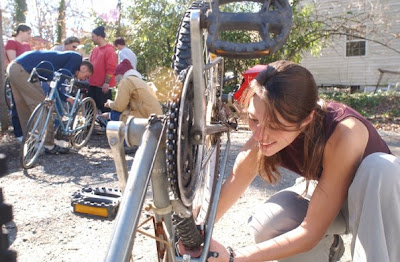
Last Thursday February 19th, Timothy Beatley, a Teresa Heinz Professor of Sustainable Communities at the University of Virginia, presented a lecture titled “Planning for Resilient Cities”. A graduate of the Department of City and Regional Planning at UNC, Timothy Beatley is widely recognized as the leader in the Green Urbanism movement.
Sponsored by the DCRP Planners’ Forum, the UNC Scholars Program and the Institute for the Environment this talk was chock full of brilliant examples of sustainable initiatives undertaken by cities from around the world. Here is just a small sample of what he talked about.
Did you know that there are houses out there that are not only carbon neutral but actually “plus energy”? These houses produce more energy from renewable resources than they consume, thus putting energy back into the grid. One house actually revolves to capture more sunlight!
Copenhagen has done much to integrate bicycles into people’s every day routine. There are valet bicycle parking lots, and one multistory parking garage has a café and a bicycle/pedestrian only access to the center of the city. In Helsinki the bicycle share program is free and paid for by advertising on the bicycles’ wheels and frame. Plus the program provides jobs for the underprivileged! And think about the amount of space that bicycles and pedestrians save.
Christiansfeld, Denmark has adopted a Naked Streets initiative to create shared space on roads. All signs and markings have been removed from the focus streets and intersections to encourage drivers to be more cautious. Now drivers are forced to make eye contact with other drivers and pedestrians to establish each right of way individually. This shared space concept puts pedestrians and drivers on an equal playing field with due consideration for the other users of the space. And accidents decreased as a result!
And what about the
Problem of Stuff? Australia (and almost every single other country in the world) has a Toy Library. Families can check out toys and then return them at will as their child gets bored of the toys. Wouldn’t tool libraries be another great concept?
Many cities including Vancouver are rekindling the connection between the farm and the city. Mole Hill, Vancouver converted a parking lot to a raised bed farm. Others are trying vertical farming, or the
100-mile diet or growing food in suburban back yards. One resourceful entrepreneur leases his neighbors’ back yards and grows enough food for a
CSA!
If you’d like to learn more, check out Timothy Beatley’s books on these topics:
Green Urbanism: Learning From European Cities
Resilient Cities: Responding to Peak Oil and Climate Change
Green Urbanism Down Under: Learning from Sustainable Communities in Australia
and many more!
-Daria Khramtsova, Research & Communications Intern, UNC Sustainability Office
 Image copyright greengadgets.com
Image copyright greengadgets.com






